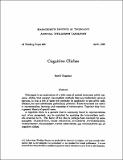| dc.description.abstract | This paper is an exploration of a wide class of mental structures called cognitive cliches that support intermediate methods that are moderately general purpose, in that a few of them will probably be applicable to any given task; efficient; but not individually particularly powerful. These structures are useful in representation, learning, and reasoning of various sorts. Together they form a general theory of special cases.
A cognitive cliche is a pattern that is commonly found in representations and, when recognized, can be exploited by applying the intermediate methods attached to it. The flavor of the idea is perhaps best conveyed by some examples: TRANSITIVITY, CROSS PRODUCTS, SUCCESSIVE APPROXIMATION, CONTAINMENT, ENABLEMENT, PATHS, RESOURCES, and PROPAGATION are all cognitive cliches. | en |
